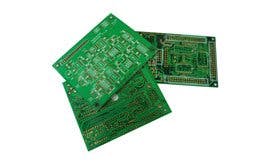All You Need To Know About Multilayer PCB
A multilayer pcb (Printed circuit board) is much like a regular circuit board, however, it has multiple layers. Whereas some double sided printable circuit boards have only 2 conductive layers a multilayer PCB has 3 or more layers. The conductive materials are found in the center of the PCB.
Multilayer circuit boards tend to be a lot stronger than double-sided PCBs. They are better at saving space which is often vital and they also offer more flexibility.
How Multilayer Printed Circuit Boards are Made
Layers of prepeg in addition to core materials are laminated under very high pressures and temperatures. It is this which works to create multilayer PCBs. The process makes sure that there is no air trapped between each of the layers. What’s more, is conductors are locked in by resin, this is the adhesive which holds each of the layers together.
Each of the layers is cured and melted correctly. The different types of materials and their combinations are nothing short of extensive. They can range from exotic ceramic to epoxy glass or even Teflon materials.
Example of a Multilayer Stackup
A multilayer stackup has:
1 layer of copper foil
1 layer of Prepeg
1 more layer of copper foil
A layer of PCB core
A layer of copper foil
1 layer of Prepeg
A final layer of copper foil
Prepeg and PCB core are in essence the same material, however, prepeg has not been fully cured. This means it is much more malleable than the PCB core. The alternating layers of foil, prepeg, and core and added to a lamination press.
Once every layer has been added high pressures and temperatures are applied. This causes the prepeg to essentially melt. This process enables all of the layers to join together efficiently and effectively. Once the multilayer PCB is cooled you are left with a solid multilayer board that is ideal for use in a range of businesses.
The Benefits of Multilayer Printed Circuit Boards

When we compare multilayer printed circuit boards to other circuit boards the benefits are:
Better EMI shielding thanks to the placement of ground layers and power
Better flexibility
Better saving on space
Easier controlled impedance
Higher assembly density
Reduced need for interconnection wiring harnesses
Reduction in the manufacture of circuit boards that aren’t strong enough
Smaller size
The benefits of using a multilayer PCB is clear. This is why many industries are now opting to use them where they can.
The Use of Multilayer Printed Circuit Boards
Multilayer PCBs are beneficial to many applications especially those where cross-talk levels are vital.
Aerospace
Atomic accelerators
Cat scan technology
Cell phone repeaters
Cell phone transmission
Central fire alarm systems
Computers
Data storage
Fiber optic receptors
File servers
GPS technology
Hand held devices
Heart monitors
Industrial controls
Nuclear detection systems
Satellite systems
Signal transmission
Space probe equipment
Test equipment
Weather analysis
X-ray equipment
Here at Avanti Circuits, we are proud to manufacture high-quality multilayer PCBs that are used by many industries.